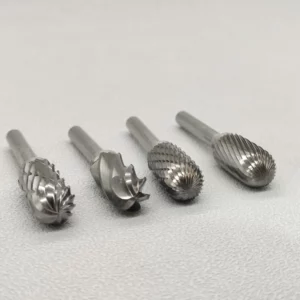Table of Contents
ToggleHow Do Solid Carbide Burrs Compare to Other Cutting Tools in Metal Fabrication?
In metal fabrication, choosing the right cutting tools is crucial for achieving precise and efficient results. Solid carbide burrs have gained popularity as versatile tools for various metalworking applications. This article will compare solid carbide burrs to other cutting tools commonly used in metal fabrication, highlighting their unique features and advantages.
Solid Carbide Burrs: An Overview
Solid carbide burrs are rotary cutting tools made from solid carbide material. They feature a series of sharp cutting edges arranged in a cylindrical or conical shape. These burrs are commonly used with hand-held rotary tools such as die grinders or electric drills. Solid carbide burrs are known for their exceptional hardness, durability, and heat resistance, making them suitable for a wide range of metalworking tasks.
Comparison with High-Speed Steel (HSS) Cutters
High-speed steel (HSS) cutters are widely used in metal fabrication due to their affordability and versatility. However, when compared to solid carbide burrs, they have some limitations. Solid carbide burrs exhibit higher hardness, which allows them to cut through harder materials like stainless steel and hardened steel more effectively. Additionally, solid carbide burrs tend to last longer and maintain their sharpness for extended periods compared to HSS cutters.
Comparison with Diamond Coated Burrs
Diamond coated burrs are another popular choice for metalworking applications. While diamond coated burrs excel in cutting extremely hard materials such as ceramics and glass, they are not as effective when working with softer metals. Solid carbide burrs, on the other hand, offer excellent performance across a wide range of metals, including aluminum, brass, and cast iron. Their versatility makes them a preferred choice for many metal fabricators.
Comparison with Abrasive Wheels
Abrasive wheels, such as grinding wheels and cut-off wheels, are commonly used in metal fabrication for material removal and shaping. While abrasive wheels are effective in bulk material removal, they may not provide the same level of precision as solid carbide burrs. Solid carbide burrs allow for more controlled and intricate shaping, making them ideal for tasks like deburring, chamfering, and creating complex contours.
Benefits of Solid Carbide Burrs
Versatility
Solid carbide burrs can be used on various metals, including steel, aluminum, copper, and alloys, making them versatile tools in metal fabrication.
Precision
The sharp cutting edges of solid carbide burrs enable precise material removal and shaping, allowing for intricate details in the workpiece.
Durability
Solid carbide burrs are highly resistant to wear and maintain their cutting performance for extended periods, reducing the need for frequent replacements.
Heat Resistance
The carbide material used in solid carbide burrs has excellent heat resistance, allowing for high-speed cutting without compromising performance.
Faster Material Removal
Solid carbide burrs, with their sharp cutting edges, can remove material efficiently, reducing overall work time and increasing productivity.
Solid carbide burrs offer several advantages over other cutting tools in metal fabrication. Their versatility, precision, durability, and heat resistance make them a preferred choice for many metalworkers. While other tools like HSS cutters, diamond coated burrs, and abrasive wheels have their specific applications, solid carbide burrs excel in providing efficient and accurate material removal and shaping across a wide range of metals. By understanding the unique features and benefits of solid carbide burrs, metal fabricators can enhance their productivity and get high-quality results in their projects.
We are COWEE
Zhuzhou Cowee Cutting Tools Co., Ltd. is a professional manufacturer and supplier of metalworking tools. The company provides high-performance standard products and special customized products, which can fully meet the various application requirements of global customers in industries such as metal processing, aerospace, and mold.
